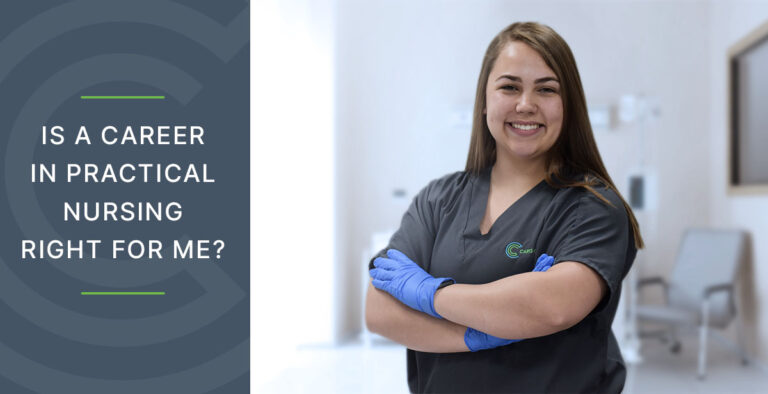There’s no question the healthcare industry would not be the same without the services of the healthcare heroes doing the important work of patient care. We’re talking about nurses, but more specifically, practical nurses. If you’re considering pursuing a career as a practical nurse but aren’t sure if it’s the right path for your future, don’t sweat it! After all, choosing the right career path is a huge decision. To help you get on the right path, let’s explore some things you need to know. But before we get too far, let’s discuss what a practical nurse does and their typical role on a healthcare team.
What are practical nurses and what do they do?
Practical nurses, also known as Licensed Practical Nurses (LPNs) or Licensed Vocational Nurses (LVNs), are health care professionals who provide basic nursing care to patients. They work under the supervision of registered nurses (RNs) and doctors and play a critical role on a healthcare team because they often provide a wide range of patient care functions. Working as a practical nurse, you can expect to perform the following duties:
• Monitoring and recording patients’ vital signs
• Assisting patients with daily living activities, such as bathing and dressing
• Administering medications and injections
• Helping with mobility issues
• Changing wound dressings
• Providing physical therapy, including exercises
• Offering emotional support to patients
• Consulting with doctors and other healthcare staff members about patient care
• Educating patients and families about treatments, medications, and preventive care measures
• Creating and maintaining medical records
• Collecting laboratory samples for testing
• Preparing equipment for treatment procedures
What are the educational requirements to become a practical nurse?
To become a practical nurse, you must complete a formal education program from an accredited school. In most states, practical nurses must be licensed. To qualify for licensure, students must complete an approved practical nursing program and pass the National Council Licensure Examination (NCLEX-PN) exam. In addition to completing an education program and passing the NCLEX-PN exam, some states also require practical nurses to complete continuing education courses on an ongoing basis in order to maintain their licensure, and most employers prefer to hire individuals who have obtained a practical nursing license.
You can also choose to specialize in a particular field of practical nursing such as pediatric, geriatric, maternal, or surgical nursing. These specializations may require additional training, which can also lead to additional opportunities.
Job market and future opportunities for practical nurses
Now that we’ve covered what practical nurses do and some of the qualifications you’ll need, let’s discuss some other key elements that may affect your decision to pursue a career as a practical nurse. For example, are you looking for a career that has long-term stability? As the demand for healthcare increases, so does the demand for practical nurses. In fact, according to the Bureau of Labor Statistics, the industry is growing rapidly and projected to add more than 41,000 new jobs by 2031.
Do I have the right traits for a career in practical nursing?
Practical nurses must possess strong communication and interpersonal skills, be detail-oriented, organized, and have the ability to problem solve and make decisions quickly. But they also must be empathetic, compassionate and able to work under stressful, high-pressure conditions. If you’re the ultimate cool under pressure type, you could be a great fit for a career in practical nursing. So, now that you know you’ve got what it takes, what should you be looking for in a practical nursing program?
What should you look for when choosing a practical nursing program?
When it comes to selecting a practical nursing program, there are a few important things you should keep in mind. First and foremost, make sure the program is accredited by the appropriate institution to ensure your degree will be recognized throughout the healthcare industry. You should also ensure that the school provides a comprehensive curriculum that covers all of the necessary subjects, including anatomy, physiology, pharmacology, and medical ethics. Additionally, look for a program that offers hands-on clinical experience. This will provide you with the real-world training that will prepare you to become a competent practical nurse.
Finally, consider the cost of the program and research any financial aid or scholarship opportunities that might be available to you. By taking the time to research your options, you can find the right practical nursing program for you and make your journey to your future a whole lot easier.
Becoming a practical nurse requires dedication and commitment to the profession, but with the right program and training, it can be a great career. If you’re ready to become the practical part of a healthcare team, check out the practical nursing program at Caris College. With an accelerated 12-month program in a fully functioning clinical lab, and real-world experience through a 506-hour externship in an actual clinical setting, Caris can help you get the hands-on training you need to launch a career as a licensed practical nurse. Contact us today to learn more and we’ll reach out to you.
More on a nursing career
